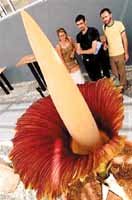 New Yorkers can breathe easy again: The "corpse flower" has passed its smelly peak. But the plant dubbed "Baby" may soon have some of its own.
New Yorkers can breathe easy again: The "corpse flower" has passed its smelly peak. But the plant dubbed "Baby" may soon have some of its own.It was the first time in 67 years that the odoriferous Amorphophallus titanum bloomed in New York City. The plant began blooming around 2 p.m. Thursday at the Brooklyn Botanic Garden. By that evening, it was giving off its signature pungent odor, a smell akin to rotten eggs or garbage left out overnight, that emanated well into Friday morning. But by Friday afternoon, visitors had to get right next to the unusual flower to take the dreadful whiff.
"It's amazing to see," Roberto Martinez, 44, a college adviser from Brooklyn, said of the flower, which grew from 351/2 inches tall 12 days ago to 661/2 inches on Friday. It gained at least 2 inches between Thursday and Friday alone.
"Good thing it only lasts a day," Martinez said of the intense odor.
About 50 people who stopped by Friday witnessed the next stage of the flower's life process: its pollination.
Alessandro Chiari, the BBG's plant propagator, used camel hair brushes to apply fine yellow pollen to the female part of the plant. The pollen came from Virginia Tech University, which has its own Amorphophallus titanum. If the pollen takes, the plant will sprout small red fruits in the next few weeks from which the museum will take seeds and grow more flowers.
"It's really about sex," observed Leeann Lavin, the museum's chief spokeswoman.
The plant's male section should have pollen available for the taking by Sunday, Chiari said. Workers plan to store that pollen
and send it to other groups who have similar plants so that they can keep the breeding going. The plant doesn't self pollinate, handlers said.
The exotic flower, native only to Sumatra and named "Baby" by handlers, burst into bloom after 10 years of nurturing from seeds. It can grow as much as seven inches a day and up to nine feet tall.
While obnoxious to humans, its smell is ambrosia to the insects -- sweat bees and carrion beetles -- that pollinate the flower in the wild. In captivity, the plant needs to be pollinated artificially.
4 comments:
isnt everything about sex?
Seems so
sex every 67 years must be depressing.
Only 5 weeks to go hon :)
Post a Comment